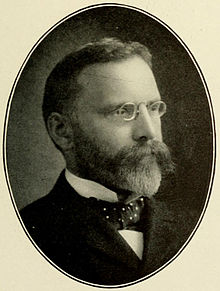Frederick Stevens (American politician)

Frederick Clement Stevens (January 1, 1861 – July 1, 1923) was a U.S. Representative from Minnesota.
Early life
[edit]Stevens was born in Boston, Massachusetts. He moved with his parents to Searsport, Maine and attended the common schools of Rockland, Maine. He graduated from Bowdoin College in Brunswick, Maine in 1881, and read law in Bangor, Maine. Stevens graduated from the law department of the University of Iowa at Iowa City in 1884. [1] He was admitted to the bar in 1884 and commenced practice in St. Paul, Minnesota.
Career
[edit]Stevens was a member of the Minnesota House of Representatives 1888 – 1891; elected as a Republican to the 55th, 56th, 57th, 58th, 59th, 60th, 61st, 62nd, and 63rd congresses, (March 4, 1897 – March 3, 1915).[2] In 1914, he was the principal Republican spokesman in the House of Representatives for the bill that ultimately was enacted as the Federal Trade Commission Act.[3] He was an unsuccessful candidate for reelection in 1914 to the 64th congress.
Death
[edit]Stevens engaged in the practice of law until his death in St. Paul, Minnesota.
References
[edit]- ^ "STEVENS, Frederick Clement, (1861 - 1923)". Biographical Directory of the United States Congress. Retrieved September 26, 2012.
- ^ "Rep. Frederick Stevens". govtrack.us. Retrieved September 26, 2012.
- ^ Marc Winerman, "The Origins of the FTC: Concentration, Cooperation, Control, and Competition, Antitrust Law Journal, vol. 71, p. 1, at p. 60 (2003).
Further reading
[edit]- Progressive Men of Minnesota (Minneapolis, 1897), p. 33
External links
[edit]- United States Congress. "Frederick Stevens (id: S000878)". Biographical Directory of the United States Congress.
- Republican Party members of the Minnesota House of Representatives
- Bowdoin College alumni
- Politicians from Boston
- People from Searsport, Maine
- Politicians from Bangor, Maine
- Politicians from Saint Paul, Minnesota
- 1861 births
- 1923 deaths
- University of Iowa College of Law alumni
- Minnesota lawyers
- Republican Party members of the United States House of Representatives from Minnesota
- 19th-century American lawyers
